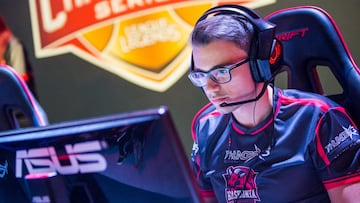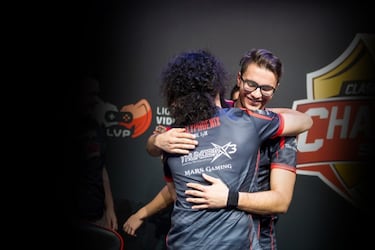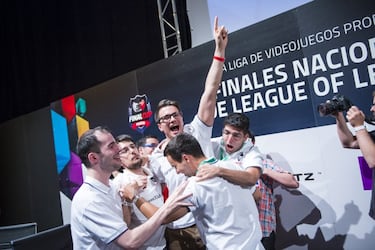Hard reality faces eSports gamers in their battle with injuries
As professionalism in electronic sports grows, so do the amount of gamers suffering from potentially career-ending injuries. AS talks with League of Legends star 'Jer0m' about his own personal struggle <a title="Nadal vs Thiem live online: French Open semi-final" href="http://en.as.com/en/2017/06/09/other_sports/1496999315_344703.html">Nadal vs Thiem</a>

Electronic sports are no longer in their infancy. Indeed there is now already a very tangible media and economic attention on the growing phenomenon, with more and more people affirming that eSports are inexorably approaching commonality with traditional sports.
As its popularity increases, establishments such as clubs, associations and leagues are becoming more aware of the need to adapt to the new demands that professionalisation requires. Such has been the evolution of eSports that today it is not uncommon to see coaches, analysts or psychologists within the organisations of top level teams. Professionalism also presents another necessity: how to best deal with the inevitable upsurge in injuries.
Long training sessions, maintaining posture, repetitive movements
Injuries can be an economic scourge for teams or individuals involved in any sport, and with eSports it’s certainly no different. For instance, legends like Lee "Flash" Young Ho, one of the best players in the competitive field of Starcraft, recently had to undergo surgery on his arm because of the pains he had contracted from playing the game repetitively.

Long training sessions, maintaining posture and performing a lot of repetitive movements are a risk to the body that many people do not appreciate. Jerónimo "Jer0m" Pujades, a professional player in the League of Legends, has also gone through a torrid time due to injuries, with his spell for top team Baskonia cut short due to his inability to reach the desired level. Since then he’s had to spend a lot of time and effort trying and find a solution to his acute wrist problem.
"It started to hurt and I noticed a lack of skill and strength in my hands right after Gamergy, just when I signed for Baskonia. The tingling was constant at night and I could not close my fist," he remarks.
This initial pain which started hampering his performance was only the beginning of a long journey for Jer0m. He would soon encounter one of the greatest obstacles in his attempts to alleviate his injury: an incorrect diagnosis: "I called a physio and he gave me a massage for tendinitis, which was what he thought I had, and it was of no use at all. When I arrived in Vitoria the club provided me with a proper physio who said that my symptoms were of tendinitis, and he opted to perform massages as well.”
The search for treatment continued for Jerome: "We tried a technique in which I was pricked with needles. They 'reset' the muscle. It hurt quite a bit, although for the first time I noticed some improvement, very little of it anyway".
It was a difficult period for a player who had previously been showing substantial talent. "My level was lowered and I couldn’t perform,” he says. “It was a vicious circle in which the worse I played, the more I wanted to train and, of course, I only experienced more pain. Mentally it was very hard."
Baskonia invested a lot of resources in him during his season in the LVP Honor Division and as Jer0m himself admits: "Baskonia had high demands and I could not reach that level because of the pain. It led to my departure to [rival team] Penguins Mafia ".
Carpal Tunnel Syndrome
Right now Jerome is back at his house in Ontinyent, near Valencia, which is where he finally found the answer to his problem: "My sister, who is a doctor, put me in touch with a traumatologist. I had an electromyogram. Some patches measured my reaction to electrical impulses and finally told me that I had Carpal Tunnel Syndrome on both wrists. They told me that it was something chronic and that I‘d have to live with it all my life. At least then we could take action."
A number of medications such as anti-inflammatories proved useful in his recovery, but as Jerónimo reveals: "What has helped me the most are splints on my wrists that I wear at night. I sleep with a good posture and doing that at least I start the day with almost no pain."
As Jerónimo can now testify, injuries require professionals who know how to treat them properly. José Feito is one of the foremost physiotherapists in the country, and through his hands have passed several first-class athletes, including all-time top goalscorer of the Spanish national football team, David Villa.
At his clinic in the Asturian city of Avilés, AS spoke to Feito to get a professional opinion on some of the common injuries that occur in electronic sports.
"Muscle tissues adapt to the work that is asked of them,” says Feito, “But to perform actions in a repetitive way, as is the case with electronic sports, this takes the body to its limit. It's similar to what MotoGP riders suffer; they spend hours squeezing and braking, a seemingly harmless gesture, but something that does not allow the muscle to oxygenate."

Better posture and diet can help
For obvious reasons, wrist and hand problems are the most frequent injuries when it comes to eSports, but Feito explains that there are other culprits too. "There is a lot of talk about hands and wrists, but it is important to have good ergonomics when it comes to sitting and to not jeopardise your intervertebral discs. These fashionable rally chairs are comfortable, but they may not be suitable for long gaming sessions," warns Dr. Feito.
This is something reiterated by Jer0m too:" I had one and I changed it for a normal office chair. In the rally seats your shoulders are pushed in and you end up damaging the muscles.”
As Jer0m knows all too well, not everything is solved when a specific problem is correctly detected in the body. Recovery is fundamental when dealing with an injury, he says, but so is finding ways of shortening the recovery period so that you don’t lose ground on your rivals.
"In the League of Legends you cannot take a break. If you are away for a long time, the game will pass you by. That is why I think that shortening recovery times are fundamental towards extending the short careers we have."
José Feito agrees with the player and goes further: "The recovery from an injury is as much or more important than the treatment, but it requires a lot of discipline on the part of the player."
Picking up better lifestyle habits are something the physio says could particularly help. "A balanced diet and aerobic work are two pillars in the professional life of any type of athlete," assures Feito.
Asked about this, Jer0m admits that the usual stereotypes of a videogamer in this area are generally true. "I've been with people at Gaming House who ate kebaps and nuggets all the time! I think that endangers your future in addition to your performance."
A need for physio professionals
Related stories
Something else that both agree on is the need to hire professionals such as physiotherapists at eSports clubs, or at least to promote a mutuality that will help treat the increasing number of players who suffer from injuries. "It is essential that someone advises on such elementary things as stretching or correct playing positions," stresses Dr Feito.
Jer0m, however, comments on how difficult that it currently still is in turning this idea into a reality. "Clubs have no doctor,” he says. “I was lucky at Baskonia, but it’s not common. In fact, clubs do not usually take care of the expenses, and if you have a problem you can say goodbye to your whole salary in treatments ."

